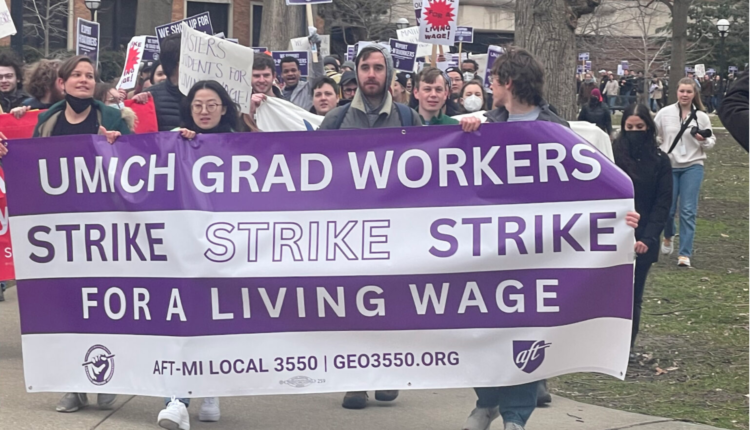State Administrative Law Judge Reverses Trial Court: Rules Striking Grad Students Must Stop Their Strike
by Jon King
A state administrative law judge ruled that the University of Michigan Graduate Employees’ Organization (GEO) AFT Local 3550 violated the no-strike clause in its current contract when they walked off the job on March 29.
The union is an affiliate of the American Federation of Teachers (AFT) and represents almost 2,300 Graduate Student Instructors (GSIs) and Graduate Student Staff Assistants (GSSAs) at the University of Michigan.
The decision, which was issued on behalf of the Michigan Employment Relations Commission (MERC), was made by David Peltz, an administrative law judge with the Michigan Office of Administrative Hearings and Rules.
“The undisputed facts establish that the GEO engaged in conduct wholly inconsistent with its obligations under the contract,” wrote Peltz. “By agreeing to Article III, the GEO is contractually obligated to refrain from causing, instigating, supporting or encouraging any ‘concerted interference with the operation of the University’ including the ‘failure, in whole or part, to fully, faithfully, and properly perform the duties of employment.’”
Peltz recommended that the full commission order the GEO to cease and desist violating its contract, and end the strike. It further recommended the union be required to notify its members that it has committed unfair labor practices.
GEO leaders say they will appeal the ruling, which was made in response to an unfair labor practice charge filed by U of M the day the walkout began.
“We will appeal the ALJ’s recommended decision to the entire commission, until which time the order is not final,” said GEO Secretary Karthik Ganapathy. “No court can decide to suspend our strike as the decision to strike (or not) is up to the rank-and-file members of our union.”
University spokesperson Rick Fitzgerald said the language of the current pact is unambiguous in that striking prior to its end date of May 1 constituted a breach of contract.
“Despite knowing that this strike violates its own contractual promise not to strike, striking GEO members walked out on their students and have declined to return to work,” said Fitzgerald. “This has left our students’ exams and final grades in jeopardy at a crucial time near the end of the semester.”
Fitzgerald added that university officials continue to believe the issues at hand are best resolved at the bargaining table.
“While the university has worked diligently to ensure that the negative impact felt by students is minimized, it is in the best interest of the entire campus community, especially our undergraduate students, for GEO to stop its strike and return to the classroom,” he said.
Ganapathy, however, noted that the university was more interested in pursuing its legal options rather than meeting “their ethical obligation to fix the myriad of problems that graduate students face.”
The main point of contention is a union proposal for a 60% wage increase in the first year of a new contract, with additional increases tied to inflation in the second and third years. So far, the GEO has turned down three counteroffers from the university, including an 11.5% pay increase over the next three years.
The university has also objected to several other union demands it says are outside the scope of the Michigan Employment Relations Act. Those include that the university “fund an unarmed and non-police urgent response program separate from the Division of Public Safety,”and a proposed “immigration protection” proposal that demands that other than instances involving a validly executed search or arrest warrant, the university not cooperate with requests of federal immigration authorities to enter a workplace or inspect records nor comply with requests of federal immigration authorities to inspect pertinent immigration forms and documentation.
The GEO bargaining platform says both of those issues arise out of an “Unaccountable and opaque approach to campus safety,” the union says fails to protect union members.
“The University spends over $30 million on policing, security, and surveillance while underfunding offices that prevent sexual assault and provide mental health support,” states the platform. “Due to this, graduate student workers can’t even earn a living wage or access the supports we need to keep ourselves, each other, and our students safe.”
Meanwhile, the union has a series of pickets planned throughout what is now the fourth week of the strike, with bargaining sessions planned for Wednesday and Friday.
On April 20, striking workers confronted U-M President Dr. Santa Ono as he ate in a restaurant near campus. Two of the striking workers were temporarily detained by U-M Police. The video, below, was posted to social media by the University of Michigan Graduate Employees Organization (GEO). In it, U-M Police can be seen attempting to detain two graduate students who were peacefully protesting. The officers, circled by protesters and bystanders who shouted, “Let them go,” eventually released the two students.


 )
)
Comments are closed, but trackbacks and pingbacks are open.